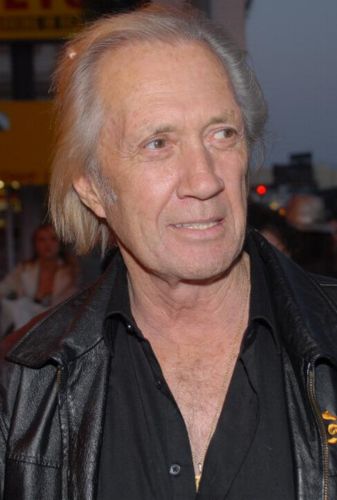David Carradine
David Carradine was an enigmatic actor whose career spanned more than four decades. Born on December 8, 1936, in Hollywood, California, Carradine was part of an esteemed acting family that included his father, John Carradine, and half-brothers Keith and Robert Carradine. Known for his deep, calm voice and striking presence, Carradine’s legacy is most notably tied to his role as Kwai Chang Caine in the television series “Kung Fu,” which introduced Eastern philosophy and martial arts to Western audiences.
Early Life and Career Beginnings
Family Background
- Son of actor John Carradine and Ardanelle Abigail McCool.
- Half-brother to actors Keith and Robert Carradine.
Education and Military Service
- Attended San Francisco State University.
- Drafted into the United States Army, where he drew theatrical performances for the troops.
Acting Career
Television Breakthrough
“Kung Fu” (1972-1975): Starred as the Shaolin monk, Kwai Chang Caine, a role that brought him international fame.
Film Highlights
- “Boxcar Bertha” (1972): Directed by Martin Scorsese, this film marked one of Carradine’s early leading roles.
- “Bound for Glory” (1976): A biopic where Carradine played folk music legend Woody Guthrie.
- “The Long Riders” (1980): A Western featuring Carradine alongside his brothers Keith and Robert.
- “Kill Bill: Volume 1 & 2” (2003-2004): Directed by Quentin Tarantino, Carradine played the infamous Bill, revitalizing his career in later years.
Personal Life
Marriages and Family
Carradine was married five times and had several children.
Martial Arts and Philosophy
His role in “Kung Fu” sparked a lifelong interest in martial arts and Eastern philosophy.
Awards and Nominations
Golden Globe Awards
- Nominated for Best Actor – Television Series Drama for “Kung Fu” (1973).
- Nominated for Best Actor in a Motion Picture – Musical or Comedy for “Bound for Glory” (1977).
Legacy and Impact
Influence on Pop Culture
Carradine’s portrayal of Kwai Chang Caine in “Kung Fu” left a lasting impact on American pop culture, introducing many Western viewers to the concepts of martial arts and Eastern philosophies for the first time. The show remains a cult classic and has inspired numerous spin-offs, homages, and discussions about its cultural significance.
Revival in “Kill Bill”
The “Kill Bill” series brought Carradine back into the spotlight, showcasing his ability to embody complex characters and leaving a memorable mark on modern cinema. His portrayal of Bill provided depth to a villainous character and demonstrated Carradine’s range as an actor.
Philanthropy and Off-Screen Pursuits
Artistic Endeavors
Aside from acting, Carradine was also an accomplished musician and artist. He released several albums and was passionate about painting and sculpting.
Health and Wellness Advocate
Carradine was an advocate for health and fitness, often promoting the benefits of martial arts in achieving physical and mental well-being.
Controversies and Personal Struggles
Legal and Personal Issues
Throughout his life, Carradine faced various personal challenges, including legal issues and substance abuse, which he openly addressed in interviews and his autobiography.
Conclusion
David Carradine’s life story is one of artistic triumphs, personal explorations, and human complexity. His contributions to film and television have left an indelible mark on Hollywood and the audiences who cherished his work. From “Kung Fu” to “Kill Bill,” Carradine’s performances resonated with authenticity and intrigue, earning him a revered place in entertainment history. His legacy continues to influence actors and filmmakers, and his life serves as a reminder of the enduring power of reinvention and the human spirit’s capacity for growth.

